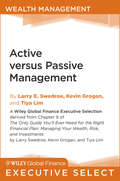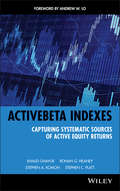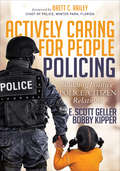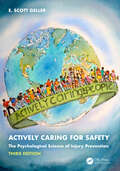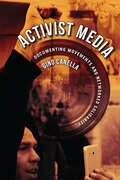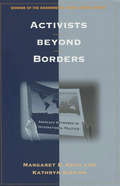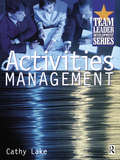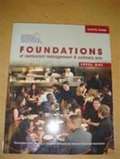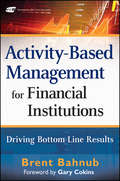- Table View
- List View
Active and Semi-active Suspension Systems: Modeling, Control, and Fault Diagnosis (Synthesis Lectures on Advances in Automotive Technology)
by Amir Khajepour Yukun Lu Chen SunThis book comprehensively explores fundamental aspects of adaptive vehicle suspension systems, offering numerous examples for suspension modeling, control, estimation, and fault diagnosis and prognosis methodologies. It is intended for senior undergraduate and graduate students, vehicle R&D departments, and anyone with an interest in the design and control of adaptive or active suspension systems. In order to simplify the understanding of more difficult concepts, the book uses a step-by-step approach along with pictures, graphs, and practical examples. The book begins with an introduction of vehicle adaptive suspensions, highlighting some common mass-produced products in recent decades. Furthermore, three widely-used mathematical models of adaptive suspension systems are derived. Subsequently, four suspension control algorithms and gain-adaptive approaches are introduced, accompanied by MATLAB/Simulink programming examples for enhanced understanding and practical implementation. Lastly, the fault diagnosis and prognosis of adaptive suspension systems are introduced.
Active versus Passive Management (Wiley Global Finance Executive Select #145)
by Larry E. Swedroe Kevin Grogan Tiya LimThe active versus passive debate is a contentious issue. Filled with concrete evidence and comprehensive money management strategies, this chapter from The Only Guide You'll Ever Need for the Right Financial Plan delves into the case for passive investing over active investing. You can do so by investing in passively managed investment vehicles like index funds and passive asset class funds. You are virtually guaranteed to outperform the majority of both professionals and individual investors. Written for savvy investors and advisors, this chapter helps you: Integrate a passive investing strategy Maintain your portfolio's risk portfolio in a tax-efficient manner Determine the difference between the theories of efficient versus inefficient markets Make cost-effective investment decisions From Larry Swedroe, the author of the bestselling series of "The Only Guide" investment books, with Kevin Grogan and Tiya Lim, this chapter helps you integrate diversification, low turnover, and asset allocation into one plan that meets the needs of a unique situation.
ActiveBeta Indexes
by Andrew W. Lo Ronan G. Heaney Stephen A. Komon Stephen C. Platt Khalid GhayurAn informative guide offering new and innovative ways to think about active management and investingActiveBeta Indexes presents exciting new research that shows how above-market returns can be achieved in a low-cost, transparent, and efficient fashion. Active Betas reflect fundamental investment principles that have long been the foundation of active equity returns, but are commonly masqueraded as investment skill, or alpha. This groundbreaking book lifts the veil to uncover the common sources of active returns and reveals their beta-like properties.Developed by leading investment practitioners at Westpeak Global Advisors, ActiveBeta Indexes introduces Active Beta sources and explains how the behavior of short- and long-term earnings growth gives rise to systematic sources of active equity returns.Details a new index framework and research findings that could change the face of active portfolio managementPresents patent-pending innovations for constructing style indexes and informationally-efficient active portfoliosExplores the historical performance of ActiveBeta IndexesWealth advisers, consultants, pensions and endowments, and other institutional investors will find the intellectual honesty of ActiveBeta Indexes a refreshing perspective on the active management industry. They will also find it a useful guide to a more strategic allocation of their risk and management fee budgets - a growing necessity in these challenging times.
Actively Caring for People Policing: Building Positive Police/Citizen Relations
by E. Scott Geller Bobby KipperA revolutionary new approach to policing that puts people over punishment. Experts have struggled to define the term &“police culture.&” For most, this label means a reactive approach to keeping people safe by using punitive consequences to punish or detain the perpetrators. The result: More attention is given to the negative, reactive side of policing than a positive, proactive approach to preventing crime by cultivating an interdependent culture of residents looking out for the safety, health, and well-being of each other. In Actively Caring for People Policing, authors E. Scott Geller and Bobby Kipper show how police officers can play a critical and integral role in achieving such a community of compassion—an Actively Caring for People (AC4P) culture. With AC4P policing, consequences are used to increase the quantity and improve the quality of desired behavior. Police officers are educated about the rationale behind using more positive than negative consequences to manage behavior, and then they are trained on how to deliver positive consequences in ways that help to cultivate interpersonal trust and AC4P behavior among police officers and the citizens they serve. The result: humanistic behaviorism to enhance long-term positive relations between police officers and the citizens they serve, thereby preventing interpersonal conflict, violence, and harm.
Actively Caring for Safety: The Psychological Science of Injury Prevention
by E. Scott GellerActively Caring for Safety: The Psychological Science of Injury Prevention outlines proactive applications of applied behavioural science and humanism (i.e., humanistic behaviourism) for improving health and safety. This text provides evidence-based principles for customizing effective processes for improving the human dynamics of safety and health in various locations—from home to the workplace, and throughout a community. World-renowned health/safety researcher, teacher, and consultant E. Scott Geller combines theory and principles in practical step-by-step procedures with behavioral science methods capable of enhancing safety awareness, reducing at-risk behavior, and facilitating ongoing participation in safety-related activities. Drawing upon his bestselling works Working Safe and The Psychology of Safety Handbook, this book presents a science-based and practical approach to improving attitudes and behavior for achieving an injury-free work environment. The text has been improved and updated throughout and includes additional material on a rationale for language to replace common safety-related words that stifle human engagement. Plus, critical safety-relevant information is provided on empathy, emotional intelligence, self-motivation, positive psychology, psychological safety, the dramatic benefits of promoting perceptions of personal choice, and critical distinctions between leadership and management for optimizing workplace safety and productivity.Written in an enjoyable, anecdotal, and engaging style, this is an essential read for any student, academic, researcher, or professional of health and safety.
Actively Managing and Redirecting Projects: Executing Specific Growth Opportunities Using Discovery-Driven Planning
by Ian C. Macmillan Rita Gunther McgrathIn an emerging business, you will learn a lot from situations that reveal how close your assumptions are to what is actually unfolding. Sometimes, these situations or events occur naturally as you work on developing a business. Other times, you'll have to deliberately create a management intervention to get at the information. Either way, these events can be used as checkpoints in the discovery-driven plan to deliberately structure the systematic testing of assumptions as plans unfold. This chapter takes you through the design of a set of checkpoints to monitor, manage, and redirect the progress of the plan. This chapter is excerpted from "Discovery-Driven Growth: A Breakthrough Process to Reduce Risk and Seize Opportunity."
Activision: The 'Kelly Slater's Pro Surfer' Project
by Alan Maccormack Kerry Herman Enrico D'AngeloMike Ward, the producer in charge of developing the Kelly Slater's Pro Surfer game for Activision, must decide whether to launch the game in time for the 2002 Christmas season. Complicating his decision are the lukewarm response from consumers to TV test spots of the game and the need to fund a multimillion dollar marketing campaign. Also describes Activision's approach to game development, which was based on a green-light process adopted by the firm in 2000 to better control new game development better.
Activism and the Fossil Fuel Industry
by Johannes Urpelainen Andrew CheonIn less than a decade, activism against the fossil fuel industry has exploded across the globe. While environmentalists used to focus on legislative goals, such as carbon emissions trading or renewable energy policies, today the most prominent activists directly attack the fossil fuel industry. This timely book offers a comprehensive evaluation of different types of activism, the success and impact of campaigns and activities, and suggestions as to ways forward. This book is the first systematic treatment of the anti-fossil fuel movement in the United States. An accessible and readable text, it is an essential reference for scholars, policymakers, activists, and citizens interested in climate change, fossil fuels, and environmental sustainability. The entire book or chapters from it can be used as required or supplementary material in various courses at the undergraduate and graduate level. As the book is not technically challenging but contains a comprehensive review of climate change, fossil fuels, and the literature on environmental activism, it can be used as an accessible introduction to the anti-fossil fuel campaign across disciplines.
Activism, Change and Sectarianism in the Free Patriotic Movement in Lebanon (Reform and Transition in the Mediterranean)
by Joseph P. HelouThis book explores the thirty-year trajectory of the Free Patriotic Movement that aimed to achieve the freedom, sovereignty and independence of Lebanon from the Lebanese political elite and Syrian hegemony. It sheds light on the movement’s activism, changes and sectarianism throughout the stages of movement emergence, persistence and party transformation. The author shows how the movement built on opportunities that culminated in its rise, both in civil society and nationally, despite a number of challenges. The book also reveals the formation of intricate units and communication channels to mobilize activism and increase commitment to the movement’s cause. While discussing the significance of Michel Aoun and Gebran Bassil to the future of the FPM, the author asserts that various party dimensions and practices are conditioned by regional and international politics.
Activist Media: Documenting Movements and Networked Solidarity
by Gino CanellaNow more than ever, activists are using media to document injustice and promote social and political change. Yet with so many media platforms available, activists sometimes fail to have a coherent media and communication strategy. Drawing from his experiences as a documentary filmmaker with Black Lives Matter 5280 and Service Employees International Union (SEIU) Local 105 in Denver, Colorado, Gino Canella argues that activist media create opportunities for activists to navigate conflict and embrace their political and ideological differences. Canella details how activist media practices—interviewing organizers, script writing, video editing, posting on social media, and hosting community screenings—foster solidarity among grassroots organizers. Informed by media theory, this book explores how activists are using media to mobilize supporters, communicate their values, and reject anti-union rhetoric. Furthermore, it demonstrates how collaborative media projects can help activists build broad-based coalitions and amplify their vision for a more equitable and just society.
Activist Retail Investors and the Future of Financial Markets: Understanding YOLO Capitalism (Routledge International Studies in Money and Banking)
by Usman W. Chohan Sven Van KerckhovenContemporary financial markets have been characterized by sociocultural phenomena such as "meme stocks", the Gamestop short squeeze, and "You Only Live Once (YOLO) trading". These are movements led by small-scale retail investors banding together to participate forcefully in financial markets through decentralized but coordinated actions. This book deploys many different subdisciplines to explore the recent ‘power grabbing’ of retail investors and the online environment that enables them to join the ranks of major financial players, and participate in contemporary capitalism. It offers multiple perspectives on the genesis, role, motivations, power, and future prospects of retail investors as a force in contemporary financial markets. Drawing upon the insights of authors hailing from many different countries, the book frames YOLO capitalism through numerous angles that help to explain the context and the importance of activist retail investors in modern financial markets, and thereby explore the possibilities of a transformed financial future with much wider small-scale participation. The book assesses the potential of online - and other - communities in enabling global coordination in impacting or even driving financial and crypto markets, and the challenges that come with it and weighs the competing narratives both positive and negative regarding YOLO capitalism. It strikes a balanced assessment of their legal, cultural, behavioural, economic, and political roles in modern finance. This book will be of interest to a multidisciplinary and interdisciplinary audience of scholars in financial markets, financial regulation, political economy, public administration, macroeconomics, corporate governance, and the philosophy and the sociology of finance.
Activist Unionism: Institutional Economics of Solomon Barkin
by Donald R. StabileFirst Published in 1994. Routledge is an imprint of Taylor & Francis, an Informa company.
Activists beyond Borders: Advocacy Networks in International Politics
by Margaret E. Keck Kathryn SikkinkIn Activists beyond Borders, Margaret E. Keck and Kathryn Sikkink examine a type of pressure group that has been largely ignored by political analysts: networks of activists that coalesce and operate across national frontiers. Their targets may be international organizations or the policies of particular states. Historical examples of such transborder alliances include anti-slavery and woman suffrage campaigns. In the past two decades, transnational activism has had a significant impact in human rights, especially in Latin America, and advocacy networks have strongly influenced environmental politics as well. The authors also examine the emergence of an international campaign around violence against women.
Activities Management (Team Leader Development Ser.)
by Cathy LakeActivities Management is a comprehensive guide to running a smooth and successful operation. It includes:* practical help on how to plan and manage work;* health and safety in the workplace;* environmental considerations that today's supervisor needs to know. The Team Leader Development Series is an essential tool towards gaining the Supervisory Management Award. Consisting of four practical and interactive textbooks, this series will be invaluable not only to students, but also as a guide individuals and organisations seeking to improve their business performance at the first level of management.Key learning features:* Learning Objectives to enable the reader to assess the knowledge gained throughout the series.* Activities to put the learning into practice.* Case studies - 'true-life' scenarios!* Workbased Assignments which will also provide evidence for S/NVQ portfolios.* Language is straightforward and direct, contextualised to relate to team leaders and supervisory managers working in a wide range of industry sectors.* Influential protagonists in the field will be alluded to as appropriate to support the learning.Tutor resource material for each title in the series is available either as hard copy or is downloadable from the BH website. Please contact BH marketing on bhmarketing@repp.co.uk.
Activity Accounting--Another Way to Measure Costs
by William J. Bruns Jr.Explains the principal differences between traditional cost accounting systems and activity-based costing systems.
Activity Based Management at W.S. Industries (B)
by V. G. Narayanan Jeremy CottDescribes activity-based budgeting at W.S. Industries. Also describes target costing-led product redesign, and product, customer, and order profitability.
Activity Based Management: Improving Processes and Profitability (Routledge Revivals)
by Brian PlowmanThis title was first published in 2001: Product and particularly customer profitability are black holes in most managers’ understanding of their business. Identifying customer revenue is easy but identifying what they cost - so we can understand whether or not they are profitable - is difficult. In a world in which competition, regulation and the increasing use of the Internet put ever greater pressure on margins it is vitally important to understand both product- and customer-profitability. Activity Based Management (ABM) enables you to do this. This book explains the power of using ABM to increase the profitability of your business. It provides step-by-step guidance on basic principles, comparisons between traditional methods, definitions of processes, activities and cost-drivers as well as details of data collection techniques and implementation steps. Through the book’s numerous detailed examples a logical picture builds up of how to obtain the benefits that ABM can deliver. On its own ABM will change management decision-making: by showing how ABM also supports other profit improvement initiatives such as Business Process Reengineering, Shareholder Value Added and Customer Relationship Management, managers will learn how they can use the best possible toolkit to put their business firmly on the road to leaps in profitability.
Activity Guide For Foundations Of Restaurant Management And Culinary Arts: Level 1
by National Restaurant Association Staff<P>Industry-driven curriculum that launches students into their restaurant and foodservice career<P>! Curriculum of the ProStart(r) program offered by the National Restaurant Association.<P> The National Restaurant Association and Pearson have partnered to bring educators the most comprehensive curriculum developed by industry and academic experts.
Activity-Based Costing and Capacity
by Robert S. KaplanDiscusses the use of budgeted rather than historical data in an activity-based costing (ABC) model and argues for calculating rates using practical capacity, not actual utilization. An ABC model need not be limited to analysis of historical data. When cost driver rates are calculated based on forecasted data, they can be used proactively for decisions such as pricing and order acceptance. Second, to avoid distortion of cost driver rates caused by unused capacity, the rates should be calculated using the practical capacity of the resources performing the activity. Discusses how to estimate practical capacity in various situations, including lumpy capacity acquisition, ramp-up of capacity utilization, seasonal and peak-load capacity, and differing service quality levels from supplied capacity.
Activity-Based Costing: Introduction
by Robert S. Kaplan Robin CooperProperly constructed activity-based costing (ABC) systems provide more accurate cost information about business activities and processes, and about the products, services, and customers served by these processes. ABC systems focus on organizational activities as the key element for analyzing cost behavior by linking organizational spending on resources to activities and business processes performed by these resources. This chapter describes the foundations of activity-based costing.
Activity-Based Management at Stream International
by Robert S. Kaplan Norman KleinStream International's Crawfordsville, Indiana facilities undertake the design and implementation of an activity-based costing project. After analyzing the costs assigned to 161 work activities, Crawfordsville managers present five proposals for change based on ABM results, then meet to decide which to implement.
Activity-Based Management for Financial Institutions
by Brent J. BahnubDiscover how to use activity-based management to improve your bottom line The first book of its kind to focus on activity-based management in the financial services industry, Activity-Based Management for Financial Institutions: Driving Bottom Line Results will show you how to drive changes to your organization's bottom line. After providing a brief overview of a financial services activity-based costing model, this book focuses on how to directly improve net income, covering essential topics including costing, chargeback, and pricing; implementing ABC; implementing ABM; managing organizational change; and avoiding pitfalls. Written for those in the financial services industry-banks, securities firms, insurance companies Reveals how to drive benefits to the bottom line through disciplined execution of activity-based management and organizational change management Provides real world examples and tools for quick results and sustained success This one-of-a-kind book will take your financial institution from stuck to financially successful, driving profitability and performance.
Activity-Based Management: Operational Applications
by Robert S. Kaplan Robin CooperThe activity-based costing (ABC) model provides managers with a more accurate economic map of organizational spending and activities. How can managers benefit from this information? Activity-based management (ABM) accomplishes its objective through two complementary applications: operational and strategic ABM. This chapter examines operational activity-based management, which encompasses the actions that increase efficiency, lower costs, and enhance utilization, enabling managers to achieve short-term and highly visible successes from their Stage III ABC system.
Actor-Network Theory and Tourism: Ordering, Materiality and Multiplicity (Contemporary Geographies of Leisure, Tourism and Mobility)
by René van der Duim Carina Ren Gunnar Thór JóhannessonThe recent surfacing of actor-network theory (ANT) in tourism studies correlates to a rising interest in understanding tourism as emergent thorough relational practice connecting cultures, natures and technologies in multifarious ways. Despite the widespread application of ANT across the social sciences, no book has dealt with the practical and theoretical implications of using ANT in Tourism research. This is the first book to critically engage with the use of ANT in tourism studies. By doing so, it challenges approaches that have dominated the literature for the last twenty years and casts new light on issues of materiality, ordering and networks in tourism. The book describes the approach, its possibilities and limitations as an ontology and research methodology, and advances its use and research in the field of tourism.The first three chapters of the book introduce ANT and its key conceptual premises, the book itself and the relation between ANT and tourism studies. Using illustrative cases and examples, the subsequent chapters deal with specific subject areas like materiality, risk, mobilities and ordering and show how ANT contributes to tourism studies. This part presents examples and cases which illustrate the use of the approach in a critical way. Inherently, the study of tourism is a multi-disciplinary field of research and that is reflected in the diverse academic backgrounds of the contributing authors to provide a broad post-disciplinary context of ANT in tourism studies. This unique book, focusing on emerging approaches in tourism research, will be of value to students, researchers and academics in tourism as well as the wider Social Sciences.
Acts of God and Man: Ruminations on Risk and Insurance (Columbia Business School Publishing Ser.)
by Michael PowersMuch has been written about the ups and downs of financial markets, from the lure of prosperity to the despair of crises. Yet a more fundamental and pernicious source of uncertainty exists in today's world: the traditional "insurance" risks of earthquakes, storms, terrorist attacks, and other disasters. Insightfully exploring these "acts of God and man," Michael R. Powers guides readers through the methods available for identifying and measuring such risks, financing their consequences, and forecasting their future behavior within the limits of science.A distinctive characteristic of earthquakes, hurricanes, bombings, and other insurance risks is that they impact the values of stocks, bonds, commodities, and other market-based financial products, while remaining largely unaffected by or "aloof" from the behavior of markets. Quantifying such risks given limited data is difficult yet crucial for achieving the financing objectives of insurance. Powers begins with a discussion of how risk impacts our lives, health, and possessions and proceeds to introduce the statistical techniques necessary for analyzing these uncertainties. He then considers the experience of risk from the perspectives of both policyholders and insurance companies, and compares their respective responses.The risks inherent in the private insurance industry lead naturally to a discussion of the government's role as both market regulator and potential "insurer of last resort." Following a thoughtful and balanced analysis of these issues, Powers concludes with an interdisciplinary investigation into the nature of uncertainty, incorporating ideas from physics, philosophy, and game theory to assess science's limitations in predicting the ramifications of risk.

